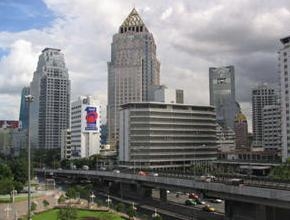The Bank of Thailand on Friday announced that the overall Thai economy had continued to improve in February, citing consumer purchases and investments which exceeded pre-flood levels.
Mathee Supapongse, senior director of the BoT Domestic Economy Department, told a news briefing that the Private Consumption Index grew by 6.6 percent compared to a year earlier in response to strong consumer demand.
Meanwhile, the Private Investment Index was up by 8.8 percent year-on-year as the post-flood restored business confidence led investors to resume their investment plans and increased investment for repair work and replacement.

The Thai central bank projected that overall investment would return to normal in the first quarter of this year.
In the meantime, production capacity in the automotive industry also surpassed the pre-flood level in tandem with acceleration in domestic vehicle sales, following a rapid increase in production to accommodate the large pent-up demand, Mathee said. The automotive industry is likely to fully recover from last year’s mega flood in the second quarter in line with the Business Sentiment Index which rose above 50 for two consecutive months.
The BoT senior director projected that the Business Sentiment Index in the next three months would climb to 56.5 as earlier last month, driven by all good factors, except production costs, which would likely stand below 50 and cause concern among entrepreneurs.
Apart from the expected production cost, the Bt300 daily minimum wage hike, which took effect on Sunday April 1 in the seven provinces scheduled first, will also impact businesses in the service and tourism sector as wages are the major operating cost.
Regarding exports, Mathee said that there were signs of recovery, resulting from the recovery in the production sector.
However, some industries, including electronics and electrical appliances, still have had limits in production after the flood crisis.
As the global economy is projected to improve in the second half of the year, Mathee saw that the improvement would benefit Thai exports.
Thailand’s exports in February reportedly edged up 1.2 percent to approximately US$17.76 billion while imports expanded by 8.2 percent to $16.56 billion.
Meanwhile, headline inflation remained relatively stable from the previous month at 3.35 percent year-on-year, Mathee said, adding that inflationary pressure continued owing to the rising global oil price and the Bt300 daily minimum wage implementation.
In a related development, the Office of Industrial Economics on Friday reported that the February Manufacturing Production Index slipped by 3.4 percent year-on-year to 171.74, but did grow by 9 percent from January.




